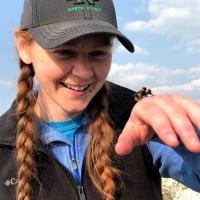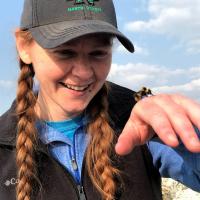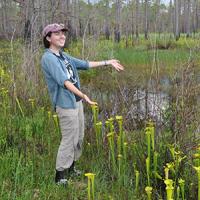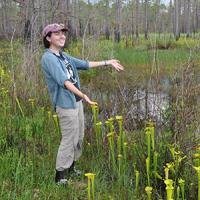The Southeast Bumble Bee Atlas is a large-scale community science effort aimed at gathering the data needed to track and conserve southeastern bumble bees. Community scientists spread out across one of our project states to survey for bumble bees and report back with whatever they find! Surveys can be run on your own or with a group of people. Survey methods are also catch-and-release, so no bees are harmed. All you need to participate is an insect net, some vials, a decent camera (including cell phone cameras), and access to the internet to submit your data. With your help, we can quickly cover large regions of the country, collect scientific-quality data, and contribute to bumble bee conservation. This project joins a growing nation-wide network of Bumble Bee Atlas projects managed by the Xerces Society for Invertebrate Conservation and partner organizations.
This workshop will cover everything you need to participate in the Southeast Bumble Bee Atlas: how to catch and photograph bumble bees, submit your data, and identify your local bumblebees. We will also cover bumble bee ecology and conservation. Anyone with an interest in bees and a desire to help them in a hands-on way is encouraged to attend—no prior experience needed!
Learn more and register today!
Laurie Hamon - Endangered Species Conservation Biologist - Xerces Society
Laurie is a conservation biologist for the Xerces Society for Invertebrate Conservation and the lead project manager for the Southeast Bumble Bee Atlas. She earned her PhD at North Carolina State University, where she conducted her thesis on the pollination ecology of Venus flytraps. She has conducted survey work for multiple rare insect species and investigated insect communities in urban pollinator gardens. Laurie was also co-coordinator on a community science project to monitor butterflies at a biological reserve in Chapel Hill, North Carolina.
Xerces Events
To request staff participation at an event or to be a speaker, please fill out our speaker request form here. For questions regarding the speaker request form contact Rachel Dunham at [email protected].
The list of events on this page will be updated regularly. To view past webinars, please visit our YouTube channel. We also announce events on social media and via our e-newsletter. If you have questions, please email [email protected].
Apr 20
8:30 AM - 12:30 PM CT
Pinson Mounds State Archaeological Park, 460 Ozier Rd, Pinson, TN 38366
Pinson, TN
Apr 21
2:00 PM - 4:30 PM CT
Zoom
Iowa, Minnesota
The Bumble Bee Atlas is a community science effort that aims to track and conserve native bumble bees. This two-hour workshop is intended for new and returning participants who wish to take part in the 2024 season of the Minnesota Bumble Bee Atlas and Iowa Bumble Bee Atlas. During this webinar, we will provide clear guidance on how to participate in the Atlas and discuss priorities for the 2024 field season. The training will cover how to conduct your own survey, where and when to survey, what supplies you'll need, and how to submit your data. We will also cover identification of the common bumble bee species you'll encounter in the field.
This webinar will serve as the last of our two-part training series. Before attending this webinar, please watch part one of the training series, "Ecology and Conservation of Bumble Bees,” taking place on April 13, 2024.
The Minnesota Bumble Bee Atlas is a collaboration the University of Minnesota, the Minnesota Department of Natural Resources, and the Xerces Society. The Iowa Bumble Bee Atlas is a collaboration between Iowa State University, the Iowa Department of Natural Resources, and the Xerces Society.
This webinar will be recorded and available on our YouTube channel.
Learn more and register today!
Speakers:
- Genevieve Pugesek - Xerces Society
- Katie Lamke - Xerces Society
- Dr. Elaine Evans - University of Minnesota
- Elise Bernstein - University of Minnesota

Genevieve Pugesek - Endangered Species Conservation Biologist, Midwest Bumble Bee Atlas - Xerces Society
Genevieve is one of the project managers of the Bumble Bee Atlas, a community science project aimed at tracking and conserving bumble bees. She works with Atlas programs in Missouri, Nebraska, Iowa, and Minnesota. She is broadly interested in conservation biology, land management, and animal natural history. She earned her Ph.D. at Tufts University, where she studied the nesting and overwintering ecology of bumble bees. Prior to working at Xerces, Genevieve worked as a postdoc at UW-Madison, studying the effects of prescribed fire in oak savannas on bumble bee abundance. Outside of work, Genevieve enjoys baking, painting, and spending time outside.
Katie Lamke - Endangered Species Conservation Biologist, Midwest Bumble Bee Atlas - Xerces Society
Katie joined the Xerces Society in 2019 to work on bumble bee conservation initiatives. Based in Nebraska, her main role is to coordinate and engage people in the Midwest's numerous Bumble Bee Atlas efforts. Working with community scientists, researchers, agency and NGO staff, she helps develop tools that drive bumble bee conservation. Katie earned her master's degree in entomology from the University of Nebraska-Lincoln, where she compared wild bee diversity and their floral associations between remnant and restored tallgrass prairies. She is enthusiastic about pollinator ecology and is committed to raising awareness about the conservation of wild bees. Outside of work, Katie enjoys birding, gardening, skating, and, well, looking for bees.
Apr 21
9:30 AM - 12:00 PM CT
Walker Branch State Natural Area, Pittsburgh Island Road, Walkertown, TN 38372
Walkertown, TN
Please join us in a collaborative effort to track and conserve the bumble bees of the Southeast through this training.
Want to connect with other Southeast Bumble Bee Atlas volunteers and get some hands-on experience? Join us for a field day! We'll go over how to use your insect net, how to collect data according to project methods, and how to identify bumble bees. Anyone with an interest in bees and a desire to help them in a hands-on way is encouraged to attend—no prior experience needed!
Learn more and register today!
Laurie Hamon - Endangered Species Conservation Biologist - Xerces Society
Laurie is a conservation biologist for the Xerces Society for Invertebrate Conservation and the lead project manager for the Southeast Bumble Bee Atlas. She earned her PhD at North Carolina State University, where she conducted her thesis on the pollination ecology of Venus flytraps. She has conducted survey work for multiple rare insect species and investigated insect communities in urban pollinator gardens. Laurie was also co-coordinator on a community science project to monitor butterflies at a biological reserve in Chapel Hill, North Carolina.
Apr 23
5:30 PM - 7:30 PM CT
Zoom
North Dakota, South Dakota, Kansas
The Great Plains Bumble Bee Atlas is a community science project that aims to track and conserve the native bumble bees of North Dakota, South Dakota, and Kansas.
This two hour workshop is intended for new participants as well as returning participants who need a refresher on the project methods.
During this event, we will provide clear guidance on how to participate in the Atlas and discuss priorities for the 2024 field season. The training will cover the project's progress, detail the process of planning and conducting surveys, submitting data, and walk through equipment that is needed to participate. We will also cover identification of the common bumble bee species found throughout the region. At the end, we'll open it up for questions and discussion, during which we invite you to turn on your camera and unmute.
This workshop is supported by the U.S. Fish and Wildlife Service.
This webinar will be recorded and available on our YouTube channel. Closed Captioning will be available during this webinar.
Learn more and register today!

Katie Lamke - Endangered Species Conservation Biologist, Midwest Bumble Bee Atlas - Xerces Society
Katie joined the Xerces Society in 2019 to work on bumble bee conservation initiatives. Based in Nebraska, her main role is to coordinate and engage people in the Midwest's numerous Bumble Bee Atlas efforts. Working with community scientists, researchers, agency and NGO staff, she helps develop tools that drive bumble bee conservation. Katie earned her master's degree in entomology from the University of Nebraska-Lincoln, where she compared wild bee diversity and their floral associations between remnant and restored tallgrass prairies. She is enthusiastic about pollinator ecology and is committed to raising awareness about the conservation of wild bees. Outside of work, Katie enjoys birding, gardening, skating, and, well, looking for bees.

Genevieve Pugesek - Endangered Species Conservation Biologist, Midwest Bumble Bee Atlas - Xerces Society
Genevieve is one of the project managers of the Bumble Bee Atlas, a community science project aimed at tracking and conserving bumble bees. She works with Atlas programs in Missouri, Nebraska, Iowa, and Minnesota. She is broadly interested in conservation biology, land management, and animal natural history. She earned her Ph.D. at Tufts University, where she studied the nesting and overwintering ecology of bumble bees. Prior to working at Xerces, Genevieve worked as a postdoc at UW-Madison, studying the effects of prescribed fire in oak savannas on bumble bee abundance. Outside of work, Genevieve enjoys baking, painting, and spending time outside.
Apr 27
9:00 AM - 1:00 PM ET
Sweetwater Creek State Park, 1750 Mt Vernon Rd, Lithia Springs, GA 30122
Lithia Springs, GA
The Southeast Bumble Bee Atlas is a large-scale community science effort aimed at gathering the data needed to track and conserve southeastern bumble bees. Community scientists spread out across one of our project states to survey for bumble bees and report back with whatever they find! Surveys can be run on your own or with a group of people. Survey methods are also catch-and-release, so no bees are harmed. All you need to participate is an insect net, some vials, a decent camera (including cell phone cameras), and access to the internet to submit your data. With your help, we can quickly cover large regions of the country, collect scientific-quality data, and contribute to bumble bee conservation. This project joins a growing nation-wide network of Bumble Bee Atlas projects managed by the Xerces Society for Invertebrate Conservation and partner organizations.
This workshop will cover everything you need to participate in the Southeast Bumble Bee Atlas: how to catch and photograph bumble bees, submit your data, and identify your local bumblebees. We will also cover bumble bee ecology and conservation. Anyone with an interest in bees and a desire to help them in a hands-on way is encouraged to attend—no prior experience needed!
Learn more and register today!

Laurie Hamon - Endangered Species Conservation Biologist - Xerces Society
Laurie is a conservation biologist for the Xerces Society for Invertebrate Conservation and the lead project manager for the Southeast Bumble Bee Atlas. She earned her PhD at North Carolina State University, where she conducted her thesis on the pollination ecology of Venus flytraps. She has conducted survey work for multiple rare insect species and investigated insect communities in urban pollinator gardens. Laurie was also co-coordinator on a community science project to monitor butterflies at a biological reserve in Chapel Hill, North Carolina.
May 4
8:30 AM - 12:30 PM ET
Stono Preserve, 5306 Dixie Plantation Road, Hollywood, SC 29449
Hollywood, SC
The Southeast Bumble Bee Atlas is a large-scale community science effort aimed at gathering the data needed to track and conserve southeastern bumble bees. Community scientists spread out across one of our project states to survey for bumble bees and report back with whatever they find! Surveys can be run on your own or with a group of people. Survey methods are also catch-and-release, so no bees are harmed. All you need to participate is an insect net, some vials, a decent camera (including cell phone cameras), and access to the internet to submit your data. With your help, we can quickly cover large regions of the country, collect scientific-quality data, and contribute to bumble bee conservation. This project joins a growing nation-wide network of Bumble Bee Atlas projects managed by the Xerces Society for Invertebrate Conservation and partner organizations.
This workshop will cover everything you need to participate in the Southeast Bumble Bee Atlas: how to catch and photograph bumble bees, submit your data, and identify your local bumblebees. We will also cover bumble bee ecology and conservation. Anyone with an interest in bees and a desire to help them in a hands-on way is encouraged to attend—no prior experience needed!
Learn more and register today!
Laurie Hamon - Endangered Species Conservation Biologist - Xerces Society
Laurie is a conservation biologist for the Xerces Society for Invertebrate Conservation and the lead project manager for the Southeast Bumble Bee Atlas. She earned her PhD at North Carolina State University, where she conducted her thesis on the pollination ecology of Venus flytraps. She has conducted survey work for multiple rare insect species and investigated insect communities in urban pollinator gardens. Laurie was also co-coordinator on a community science project to monitor butterflies at a biological reserve in Chapel Hill, North Carolina.
May 5
10:00 AM - 12:30 PM ET
Congaree National Park, 100 National Park Road, Hopkins, SC 29061
Hopkins, SC
Please join us in a collaborative effort to track and conserve the bumble bees of the Southeast through this training.
Want to connect with other Southeast Bumble Bee Atlas volunteers and get some hands-on experience? Join us for a field day! We'll go over how to use your insect net, how to collect data according to project methods, and how to identify bumble bees. Anyone with an interest in bees and a desire to help them in a hands-on way is encouraged to attend—no prior experience needed!
Learn more and register today!
Laurie Hamon - Endangered Species Conservation Biologist - Xerces Society
Laurie is a conservation biologist for the Xerces Society for Invertebrate Conservation and the lead project manager for the Southeast Bumble Bee Atlas. She earned her PhD at North Carolina State University, where she conducted her thesis on the pollination ecology of Venus flytraps. She has conducted survey work for multiple rare insect species and investigated insect communities in urban pollinator gardens. Laurie was also co-coordinator on a community science project to monitor butterflies at a biological reserve in Chapel Hill, North Carolina.
May 18
8:30 AM - 12:30 PM ET
Appalachian State University, Boone, NC
Boone, NC
The Southeast Bumble Bee Atlas is a large-scale community science effort aimed at gathering the data needed to track and conserve southeastern bumble bees. Community scientists spread out across one of our project states to survey for bumble bees and report back with whatever they find! Surveys can be run on your own or with a group of people. Survey methods are also catch-and-release, so no bees are harmed. All you need to participate is an insect net, some vials, a decent camera (including cell phone cameras), and access to the internet to submit your data. With your help, we can quickly cover large regions of the country, collect scientific-quality data, and contribute to bumble bee conservation. This project joins a growing nation-wide network of Bumble Bee Atlas projects managed by the Xerces Society for Invertebrate Conservation and partner organizations.
This workshop will cover everything you need to participate in the Southeast Bumble Bee Atlas: how to catch and photograph bumble bees, submit your data, and identify your local bumblebees. We will also cover bumble bee ecology and conservation. Anyone with an interest in bees and a desire to help them in a hands-on way is encouraged to attend—no prior experience needed!
Learn more and register today!
Laurie Hamon - Endangered Species Conservation Biologist - Xerces Society
Laurie is a conservation biologist for the Xerces Society for Invertebrate Conservation and the lead project manager for the Southeast Bumble Bee Atlas. She earned her PhD at North Carolina State University, where she conducted her thesis on the pollination ecology of Venus flytraps. She has conducted survey work for multiple rare insect species and investigated insect communities in urban pollinator gardens. Laurie was also co-coordinator on a community science project to monitor butterflies at a biological reserve in Chapel Hill, North Carolina.
May 19
9:30 AM - 12:00 PM ET
Hampton Creek Cove State Natural Area Hampton Creek Trailhead, Roan Mountain, TN 37687
Roan Mountain, TN
Please join us in a collaborative effort to track and conserve the bumble bees of the Southeast through this training.
Want to connect with other Southeast Bumble Bee Atlas volunteers and get some hands-on experience? Join us for a field day! We'll go over how to use your insect net, how to collect data according to project methods, and how to identify bumble bees. Anyone with an interest in bees and a desire to help them in a hands-on way is encouraged to attend—no prior experience needed!
Learn more and register today!
Laurie Hamon - Endangered Species Conservation Biologist - Xerces Society
Laurie is a conservation biologist for the Xerces Society for Invertebrate Conservation and the lead project manager for the Southeast Bumble Bee Atlas. She earned her PhD at North Carolina State University, where she conducted her thesis on the pollination ecology of Venus flytraps. She has conducted survey work for multiple rare insect species and investigated insect communities in urban pollinator gardens. Laurie was also co-coordinator on a community science project to monitor butterflies at a biological reserve in Chapel Hill, North Carolina.
Jun 1
10:00 AM - 12:30 PM ET
Francis Marion National Forest Huger, SC 29450
Huger, SC
Please join us in a collaborative effort to track and conserve the bumble bees of the Southeast through this training.
Want to connect with other Southeast Bumble Bee Atlas volunteers and get some hands-on experience? Join us for a field day! We'll go over how to use your insect net, how to collect data according to project methods, and how to identify bumble bees. Anyone with an interest in bees and a desire to help them in a hands-on way is encouraged to attend—no prior experience needed!
Learn more and register today!
Laurie Hamon - Endangered Species Conservation Biologist - Xerces Society
Laurie is a conservation biologist for the Xerces Society for Invertebrate Conservation and the lead project manager for the Southeast Bumble Bee Atlas. She earned her PhD at North Carolina State University, where she conducted her thesis on the pollination ecology of Venus flytraps. She has conducted survey work for multiple rare insect species and investigated insect communities in urban pollinator gardens. Laurie was also co-coordinator on a community science project to monitor butterflies at a biological reserve in Chapel Hill, North Carolina.
Jun 2
10:00 AM - 12:30 PM ET
Ceylon Wildlife Management Area Woodbine, GA 31569
Woodbine, GA
Please join us in a collaborative effort to track and conserve the bumble bees of the Southeast through this training.
Want to connect with other Southeast Bumble Bee Atlas volunteers and get some hands-on experience? Join us for a field day! We'll go over how to use your insect net, how to collect data according to project methods, and how to identify bumble bees. Anyone with an interest in bees and a desire to help them in a hands-on way is encouraged to attend—no prior experience needed!
Learn more and register today!
Laurie Hamon - Endangered Species Conservation Biologist - Xerces Society
Laurie is a conservation biologist for the Xerces Society for Invertebrate Conservation and the lead project manager for the Southeast Bumble Bee Atlas. She earned her PhD at North Carolina State University, where she conducted her thesis on the pollination ecology of Venus flytraps. She has conducted survey work for multiple rare insect species and investigated insect communities in urban pollinator gardens. Laurie was also co-coordinator on a community science project to monitor butterflies at a biological reserve in Chapel Hill, North Carolina.
